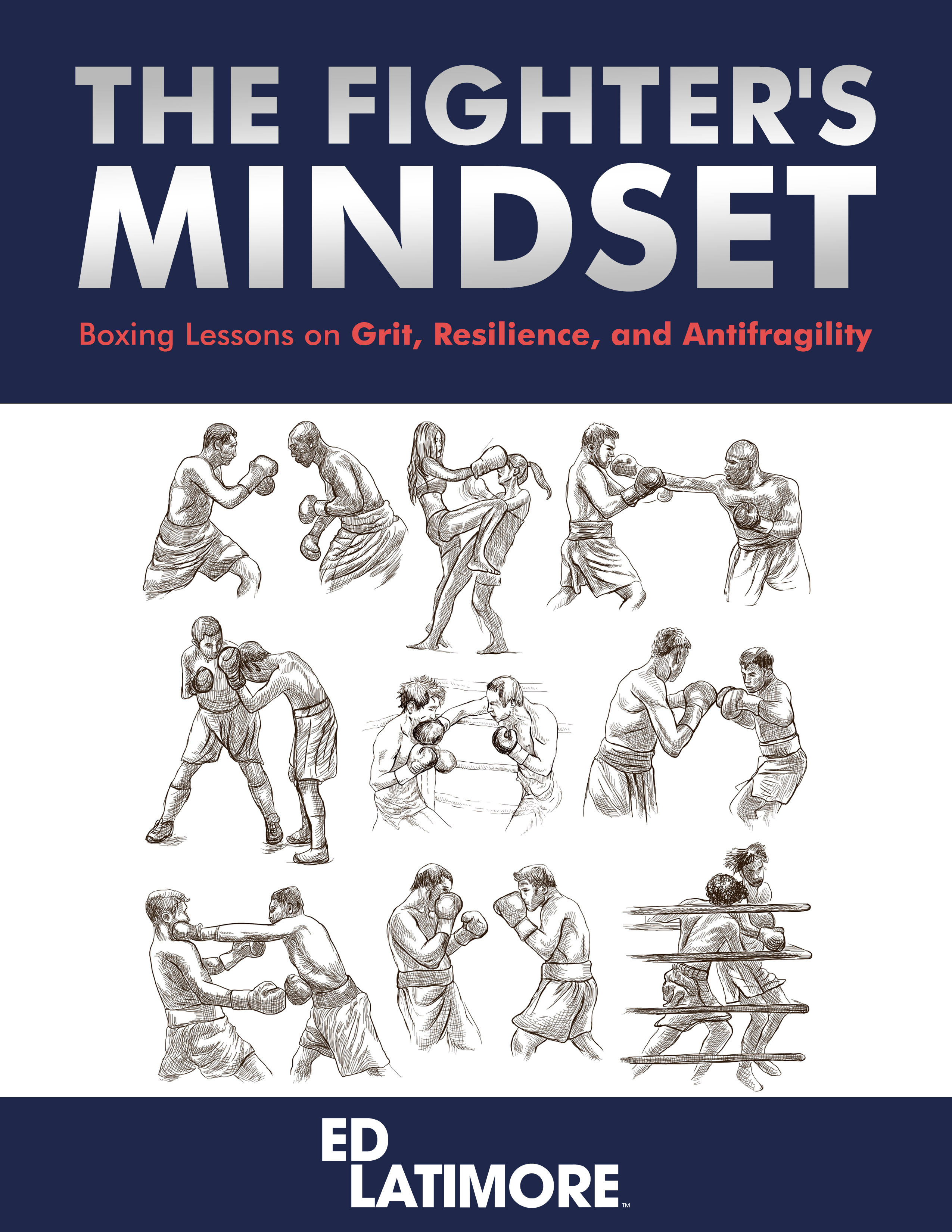The greatest rewards in life are enjoyed on the other side of the hardest challenges you’ll ever face.
Learning how to fight demands everything of you.
Most men erroneously assume they’re capable of two things – pleasing a woman in bed and winning a fight. Dedicating yourself to learning the latter can fundamentally change you in ways that you can’t comprehend.
Thankfully, most of us who learn self-defense never have to actually ever get into a street fight. In this article, you’ll learn about the gifts and lessons that are unlocked when you learn to fight.
Pain and discomfort become your friend and teacher
The vast, overwhelming, majority of human beings are flat-out soft.
I say that with no ego or pretense, only because of what I went through to become a proficient boxer, let alone a professional one. Suffering is the biggest constant when you walk into any gym that spars full-contact and legitimately teaches people to fight.
To box, you have to get comfortable keeping your hands up well past the point of physical and mental exhaustion.
To level up in Brazilian jiu-jitsu belts, you have to ignore your fatigue and body aches to explode out of a position and avoid getting choked out or having a limb snapped. Wearing a high-quality Elite Sports BJJ Gi ensures comfort, durability, and flexibility, allowing you to train harder and perform at your best.
To learn Judo, you have to control your body and use the correct grips, despite aching hands and fists, and having already gotten the wind slammed out of you several times.
Developing fighting skills requires you to change the way you experience pain and discomfort.
You sign up for pain when learning how to fight. Getting comfortable with this fact and doing it anyway builds resolve like few things in life can.
Voluntarily getting in your car before or after work, driving to the gym, and drilling boring, tedious, sometimes painful fighting techniques builds grit and dedication the more you do it. It teaches you to run toward temporary discomfort one training session at a time, in the name of the bigger picture.
This carries into your regular life as well.
Facing the real pain of training a martial art makes it easier to weed out the noise your mind creates when facing the supposed danger of missing a deadline, having a tough conversation, or dealing with your anxiety.
The most powerful supplement for training I’ve ever tried!
I know the grind of early morning training sessions. That’s why I was stoked to discover Morning Would, created by a firefighter who knows what it’s like to perform in life-or-death situations. Boxing is the hurt business, but saving lives and risking your own is on a completely different level.
This all-in-one formula combines critical electrolytes for hydration, amino acids to preserve muscle during fasted training, and nootropics for mental clarity – exactly what you need before hitting the bags at dawn or for a pick-me-up hitting the gym after a long day of work. And it’s a delicious powdered drink I can mix with my protein.
With ingredients like L-citrulline for blood flow and Alpha GPC for focus, Morning Would is perfect for fighters who need something extra to get through the grind of training.
Skip the basic pre-workouts and endless supplement stack. Morning Would is the complete package for boxers who take their morning training seriously.
The confidence you gain will carry over into other parts of life
Martial arts classes can build the type of confidence that makes you feel invincible.
The all-time great former world champion boxer said he wasn’t ready to hit the ring on fight night until he saw the otherworldly confidence of “Sugar” Ray Leonard when he looked in the mirror, and not regular old Ray Charles Leonard.
He needed the mirror to serve as a reminder of the confidence he had earned with all of the rounds of hard sparring and hitting the heavy bag, or the mornings he’d gotten up to run 5 miles at 5 a.m. since he was 14 years old.
Mythical level of confidence comes after you put the work in.
Renowned psychologist Albert Bandura called “mastery experiences” a fundamental building block for authentic confidence.1
Learning to fight brings a litany of challenges that you must overcome with your skill, will, and toughness.
Becoming a martial artist is how you earn your confidence—nerves and self-doubt won’t get in your way as much in other parts of life. That little naysaying voice in your head gets quieter when you know you can count on yourself in something as scary and grueling as a fight.
You will sharpen your mind and harden your body
There’s no drug or quick fix to get a sharper mind or a body chiseled like stone…
I hate to be the one to break that to you.
But if you dedicate yourself to learning self-defense, these are natural byproducts.
That applies whether you decide to box or train Muay Thai, Kickboxing, Judo, Mixed Martial Arts (MMA), BBJ, Krav Maga, or any other martial art fighting style.
Fighting sharpens your mind by teaching you to be calm and think under pressure. This is essential whether you’re in the gym, pro bout, or a real fight.
Fighters are most vulnerable after getting hurt by a shot. It’s because they’re compromised or disoriented that it’s virtually impossible to stay calm and think their way through the fight.
Most trainers say you’re not a true fighter until you’ve gotten hurt and kept fighting. I go into detail about lessons I learned from getting punched in the face here.
Parrying and slipping punches, mixing up your head movement, and maintaining impeccable footwork, while managing your cardio and delivering precise punches with accuracy builds neuroplasticity, coordination, and muscle memory.2
Constantly thinking your way through danger to the point that you can remember your fundamentals and execute, trains you to stay calm and think your way through any real life situation.
Becoming a martial artist will also whip you into the best shape of your life. Training a martial art for self-defense is both aerobic and anaerobic, which is why fighters tend to be muscular and cut—the ideal build that men shoot for.
It builds tremendous cardio, which means a healthy heart and better blood flow.
The more physical rewards you experience, the more you’ll want to stick to your regimen.
Your relationship with fear and danger will change
Nothing shuts down your mind like fear. But if you can face it, you can face anything.
Fear exists and is a necessary component of life, and learning to fight helps you change your relationship to fear so you can use it to your advantage.
Fighting another human being who is trying their hardest to hurt you demands that you find and trust your courage out of pure survival. It teaches you to control what you can while not freezing in fear of the things you can’t control.
It means finding peace in a simple, uncomfortable fact – this can go really bad.
Danger is a fact of life that you must always be willing to face when called upon.
Willingly facing death and injury in a fight changes your perspective on danger. Imagine how many times you face danger on the road to earning a BJJ black belt, or getting your Muay Thai shorts.
We’re wired as human beings to be able to do this, so training this part of yourself allows you to walk the streets with less fear and more awareness.
Dedicate yourself to the purest art of war
Sun Tzu, the author of “The Art of War”, wrote about the practice of generals ordering their soldiers to burn their boats, assuring no way out, other than victory or death.
Learning self-defense is the purest method of “burning the boats” in your life in our modern society.
You will dedicate yourself to strength, wage war on your fear, laziness, cowardice, and carelessness, and likely exorcise some demons.
Fighting provides instant feedback and painful stakes. You’re going to be humbled…daily.
But you’ll also develop life-changing discipline and healthy pride in yourself.
The best martial art is the one that you stick to and train like your life depended on it.
Before you jump online to debate fight styles, the effectiveness of stand-up vs. ground game, or who has the skill set to beat Bruce Lee in a street fight, get some skin in the game in the real-world by training a martial art three to five times per week.
Read more on how boxing changed my life, and use this article as the nudge you need to put in the sweat equity required for becoming your best self.
Boxing Lessons on Grit, Resilience, and Antifragility
In this e-book, I teach you 20 mindset lessons I learned from my 13-1-1 professional heavyweight boxing career.
Use these to conquer any challenges you face, in the ring or in life.
Learn how to develop the mindset of a fighter, from a fighter, so you can win the battles you face.

References
Akil, Bakari. Psychology Today. The Science of Confidence. May 1, 2010. https://www.psychologytoday.com/us/blog/communication-central/201005/the-science-confidence. (Accessed November 12, 2022) ↩
Cho, Su-Youn, So, Wi-Young, Roh, Hee-Tae. National Library of Medicine. The Effects of Taekwondo Training on Peripheral Neuroplasticity-Related Growth Factors, Cerebral Blood Flow Velocity, and Cognitive Functions in Healthy Children: A Randomized Controlled Trial. April 25, 2014. https://pubmed.ncbi.nlm.nih.gov/28441325/ (Accessed November 12, 2022) ↩

